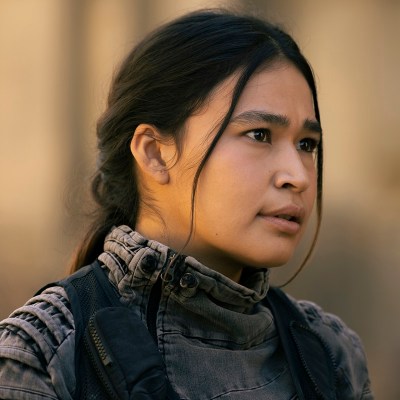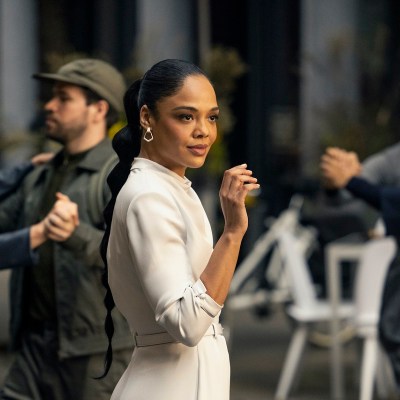This Westworld review contains spoilers.
Westworld Season 4 Episode 7
After watching “Metanoia,” I sat down in the living room with my wife and attempted to explain to her just why Westworld is so much fun for me, and specifically why Ed Harris is such a joy to watch. I spoke about his obvious acting prowess; you don’t get nominated or win as many awards as he has without having chops. I talked a little bit about the character he’s introduced playing, the Man In Black, and how he relates to the fearsome Yul Brynner Gunslinger character from the 1973 film. I talked about how the character, in the fourth season, routinely talks to a Host version of himself about the nature of reality and the philosophical question of what it means to be human. I talked about all the violent set pieces. I talked about the ensemble cast, which only seems to improve every season.
The more I talked, the more I realized that Westworld isn’t a show someone can jump in and watch; for better or worse, if you’ve not been on the ride since the beginning, you’re going to have no idea what’s happening or why it matters. Even if you have been, Westworld loves to make things confusing and frequently has fun with chronology. However, the hope is that by the end of the story, all the confusion and questioning yields satisfying results. By and large, it has, with the fourth season of Westworld being up to the caliber of the show’s unimpeachable first season in terms of telling a satisfying, twisting story in a compelling way.
Rather than hiding the way things end, the audience is told time and time again how this plays out. Bernard (Jeffrey Wright) knows every possible ending, and all of them are bad. They’re bad both for him personally, and bad for the human race as a whole. However, he’s not willing to lie down and die, or walk into the Sublime and disappear into a server-based paradise. Hope, that thing with feathers Emily Dickinson wrote a poem about, is what matters more than success or failure. Making the attempt, making a last stand, fighting the good fight for the people William (Ed Harris) calls cockroaches? That’s what matters more than Charlotte Hale (Tessa Thompson) and her mind-control towers and the promise of transcendence beyond a humanoid body.
It’s interesting to frame a story this way. There’s no chance of succeeding, and Bernard knows this. Nevertheless, he keeps going, and he’s honest with his Host friends (or anyone who asks, for that matter) along the journey. Frankie/C (Aurora Perrineau) is more concerned with seeing her dad alive again, but Stubbs (Luke Hemsworth) and Bernard share a nice final (?) moment together prior to the assault, with Bernard giving him last-second advice prior to sending him off to die. To know the outcome of a thing and to do it anyway because it’s the right thing to do is a bold stance for Bernard to take, and I can only imagine this pays off for him somehow down the line, otherwise “Metanoia” is going to be the high-water mark of a depressing end of the season for Westworld.
Writers Desa Larkin-Boutte & Denise Thé give Bernard an out. He can only see the events of Hale’s plan and his response to it through to his death. Obviously, dying means you lose insight into what happens after you’re gone in a meaningful way. Humanity has already died one death in the wake of the reveal of Rehoboam and its subsequent being taken off line. Seven years later, nothing had changed. Granted, this outbreak of violence looks more severe than previous outbreaks, judging solely from what Stubbs, Caleb (Aaron Paul), and Frankie have to fight through and what Christina (Evan Rachel Wood) and Teddy (James Marsden) witness on their walk through the city.
The Larkin-Boutte/ Thé script gives the actors a lot to work with. Any scene with Maeve tends to be a good one, and while she might have been Bernard programming her into the Sublime as a test subject, she’s still got a witty comment about the quality of her writing being sub par and Thandiwe Newton still makes hay out of every chance she gets to be snippy and dry, while not overshadowing her character’s emotional urgency to be reunited with her child. The reunion between Frankie and Caleb is beautifully done by both Aurora Perrineau and Aaron Paul; the two haven’t shared a moment of screen time this season, but this little moment feels like a reunion, which is undercut amusingly by a walled-in Stubbs interrupting to ask for his release. (Luke Hemsworth gets a lot of funny comedy this week, and he handles it very well, with a sharp, dry delivery at at least one good camera spike for good measure; he’s been the unsung hero of the Bernard arc.)
The heavier, unhappy emotional elements, particularly the Christina and Teddy walk through the city, is brilliantly done by Evan Rachel Wood. Dolores has been a villain for so long it’s hard to remember the traumatized farm girl she once was, the girl who wanted to see the beauty in between the ashes. Wood is able to recapture that with Christina, and Marsden ably plays Teddy as her tour-guide towards awakening, in a fun house mirror alternate of Teddy’s attempted sentience courtesy of Dolores. That one didn’t work out well for Teddy; this one seems equally as traumatizing to Christina thanks in no small part to the horrifying violence she’s trying desperately to stop, but can’t. There’s an anguish to her response to this violence that parallels the original Dolores, the one before William became The Man In Black, and her response to the violence in Westworld.
Undoubtedly, part of that credit goes to director Meera Menon for not only capturing Wood’s brilliant reaction, but making her anguish only a small part of the larger picture. She’s merely adding to the chorus of screaming, gunshots, and chaos with her chaotic reaction. Even the few characters not affected by the violence, be they Hosts or outliers, have to contribute to the chaos just to survive it. It’s all frenetic violence until Teddy snaps it away (for Christina), which turns it from a chaotic mess into an even bigger mystery. Is this really happening? Is this just some sort of fidelity test for Christina?
What’s real? Host William asks himself that very question, only to have his queries dismissed as insipid foolishness by his non-host self. William says, “We’re not here to transcend, we’re here to destroy,” and his Host version, the seed of himself that will life eternally, walks into the darkness to carry out that vision of reality as a great big battle royal game. In the mind of the Man In Black, the false thing isn’t Delos parks or the Sublime, it’s civilization; culture is a shared delusion to allow humans to hide from the truth of what they really are, selfish, destructive creatures about as useful as cockroaches.
Bernard saw the failure of his mission as the death of both the Human and Host races. The Man In Black sees it as an opportunity to pull the plug on the world, and leave behind only those fit to survive. William asserts that the second humans stop being roaches, they start to go extinct. He’s simply ensuring the survival of the human race by tearing the world down around them. When the stage burns down, there’s honesty amongst the ashes.
The post Westworld Season 4 Episode 7 Review: Metanoia appeared first on Den of Geek.




0 Commentaires